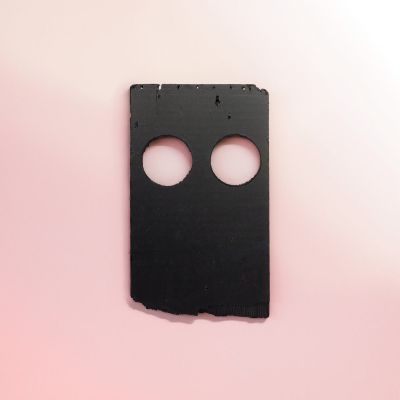If you’ve taken the time to listen to it by now, chances are the first time you pressed play on Low’s Double Negative you thought there was a problem with your WiFi or that the MP3 files had been corrupted.
Sputtering, contracting and expanding, a kiss of thistle brushing against your eardrum (if listening on headphones), “Quorum” sounds like Low accidentally left the master tapes of their new album in the pockets of their jeans on laundry day. The warped flat-tire-on-a-freeway beat behind “Dancing and Blood” and the ominous extended near-silence that follows seem to confirm as much. On initial impression, Double Negative may not seem “art damaged” so much as a work of art that has actually been physically damaged.
Anyone who claims that they saw Double Negative coming because on their last album, Ones and Sixes, Low welcomed electronic elements into their primary sound (and not just via remixes or collaborations) isn’t fooling anyone. Only in hindsight do the crinkling and scratching percussive undercurrents of songs like “Gentle” and “Into You” from that 2015 record point to the processed claustrophobia and digital dislocation of this one. Producer BJ Burton -- known for his work with the likes of Bon Iver, Sylvan Esso and more -- minimally decorated Low’s songwriting Ones and Sixes, whereas this time the two collude to majorly dismantle it. For those who missed Ones and Sixes and are coming back to see what the fuss is about here, this is an even sharper turn down a dark alley.
Low have proven themselves to be anything but trapped. They are not just free, they are doubly free.
An album such as this that sets itself apart from musical cliches should probably not be handled with critical tropes like “you won’t hear another record quite like this all year,” but the chances of another band releasing an LP closely comparable to Double Negative before 2018 is over are slim. Original from inception and consistently well received by their core fanbase, Low were not exactly at the front of the line for bands in dire need of a new direction. Twenty-five years since picking up their instruments in Duluth, Minnesota, central duo Alan Sparhawk and Mimi Parker (along with bassist since 2008 Steve Garrington) would likely make just as many people happy if they put Low on cruise control. Yet here they are, standing on the doorstep dressed all in black, scowling and soaked in acid rain with a rusty canister under their arm containing music videos seemingly filed at club night in David Lynch's Black Lodge.
There is no escaping current affairs in 2018, and the state of the world, our place in it, and how we communicate with one another about it has become an increasing focus of popular culture, including the realm of indie rock and surrounding environs. The resulting music has often focused on reaction, with the results being as different as the warm cocoon-like introversion of Yo La Tengo’s There’s a Riot Going On or the ferocious positivity of Bristol band Idles’ Joy as an Act of Resistance. The sensory confusion and separation from normality that Double Negative captures is more about the bleak post-post-modern feeling itself, rather than the fight or flight response to it. Time will tell if this album becomes as beloved a part of Low’s catalog as Long Division or Things We Lost in the Fire, but, for now, as a creative leap it feels nearly as crucial.
“This evil spirit, man, it’s bringing me down/It tells me not to do the things that I should” sing Parker and Sparhawk in clipped unison on “Disarray,” the album’s pulsing conclusion. Scratching against the sense containment that pervades Double Negative is a struggle against inaction, but the battlefield can present itself anywhere. It comes in the too-late regrets of some “Poor Sucker” at the bottom of a lake (”Should've this, should've that/Should've made a list to thank/Should have kept a better track/Put some money in the bank”) and it comes in the passive avoidance of reconnection with an old acquaintance in a grocery store in “Always Trying to Work it Out” (“I should have walked over and said hello/It seemed like you were in a hurry/I didn't want to slow you down so/I figured I should let you go”).
“Fly” could almost be a dramatic set-up for the downfall of “Poor Sucker,” Parker lamenting high and breathy, “I thought we had it made up/After all we had to pay up/Keep a market on the seller/That's the way to win a dollar.” There is something of a thematic thread of bad financial and emotional investments that runs through the album, the fall of “Rome (Always in the Dark)” fraying at the end of it. Double Negative is often about the traps that lay in wait for us and those we create for ourselves, be they distinctly modern or the stuff of old parable.
And yet, with this Double Negative, Low have proven themselves to be anything but trapped. They are not just free, they are doubly free. They already freed themselves once; first slowly from the confining perceptions of their minimalist ‘slowcore’ origins, starting with Things We Lost in the Fire and then fully with The Great Destroyer. Now, over a decade on from that pivotal time, Low have now also released themselves from that former reinvention. No longer fenced in by their initial defining sound, nor by the act of moving away from it, they are at liberty to go off in these directions, through icy glitch and gothic dub, and still be themselves. Double Negative doesn’t just capitalize on this moment of realization, it revels in it.


